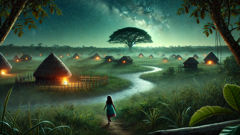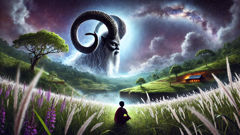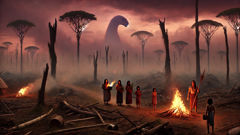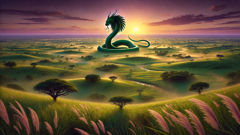Introduction
At the very heart of South America, where the land unrolls into endless green seas and the horizon smolders in golden haze, lies the ancient Paraguayan grasslands. Here, whispers of forgotten times float on the wind, and the shadows of myth still linger beneath the endless sky. For centuries, the Guarani people have called these lands home, weaving their lives into the fabric of earth and sky. To the Guarani, every stone, every blade of grass, every glimmer of moonlight carries the memory of their ancestors—and among the most enduring tales is that of the Monai, the horned serpent, guardian of the open fields. Monai is not merely a beast of terror or a caution for wandering children; to the Guarani, he embodies the wild spirit of the land itself—fierce, wise, and unfathomably old. Some say Monai was born from the breath of Tupa, the great creator, and charged with a sacred duty: to keep the balance between humankind and nature, to guard the grasslands from those who would take without respect. Villagers speak in low tones of enormous tracks left in the dew at dawn, of sudden storms that rise without warning, and of the haunting melody that floats across the plains on windless nights—a sound said to be Monai’s voice. But as the world begins to change and the grasslands yield to new roads and strange machines, the legend of Monai faces a new test. For one Guarani girl, the legend will become a living reality—a journey into the unknown, where courage and tradition must stand together against a threat that could unravel the ancient balance forever.
The Songs of the Plains
Long before the grasslands knew the weight of an iron plough or the smoke of distant cities, there lived a Guarani village nestled at the edge of a river bend. The river, known as Ysyry Guasu, snaked its way through a patchwork of fertile earth and wildflowers, its song blending with the hush of wind in tall grass. In this place lived elders who remembered the old stories and children who listened with wide eyes as night fell. Among these children was Amara, daughter of the village healer. Her hair was as black as the fertile soil and her eyes sharp as the hawk that hunted above the fields. Amara was no stranger to tales of Monai. Her grandmother, Ita, was the keeper of stories, her voice both gentle and thunderous as she spoke of the ancient serpent who slithered silently beneath the earth. 'He is the pulse of the land,' Ita would say, her hands tracing invisible patterns in the air. 'When we respect the earth, he leaves us gifts: rain for our crops, safe passage for our hunters. But when greed clouds our hearts, Monai’s horns will rise.' For Amara, these words lived on the edge of dreams—half believed, half dismissed, until one season when everything changed. That year, the rains failed. The grass grew thin and brittle, and cracks appeared in the riverbed. The village elders grew worried, offering gifts of maize and honey at the field’s edge, whispering prayers into the wind. But nothing changed. One night, as Amara lay restless beneath her woven blanket, a sound drifted through the open window—an unearthly melody, neither animal nor human, weaving a sadness into the air. Unable to sleep, Amara slipped outside, her bare feet silent in the dew. The fields glimmered under a thin crescent moon, and the song seemed to beckon her onward. She followed it through waist-high grass until she reached the old fig tree at the field’s edge. There, in the silver shadows, she saw something impossible: a massive, undulating shape, scales shimmering with every color of the twilight, crowned by two spiraling horns. The Monai. He did not roar or strike. Instead, he watched her with golden eyes ancient as the earth. Amara felt no fear, only awe. In that moment, she understood: Monai was real, and he was suffering as the land suffered. She bowed her head and whispered a promise—to learn his sorrow and to help restore the balance that had been broken.

Monai’s Warning
The next morning, Amara awoke with the memory of golden eyes burned into her thoughts. She tried to tell her mother, but was met with a worried frown—visions of Monai were for the old, or the very young. Yet something in Amara had shifted. She began spending her days by the river and her nights listening for Monai’s song, hoping for another sign. Days passed, and the drought grew worse. Crops withered, fish vanished from the river, and whispers spread among the villagers. The elders gathered under the shade of the sacred ceibo tree, debating what had angered the guardian spirit. Amara overheard them speak of a group of men from beyond the hills—strangers who had come with metal tools, cutting deep into the earth, felling trees for reasons no one could understand. The land was changing, and Monai was restless. That night, the melody returned—louder, more desperate. Amara followed it once more to the edge of the fields. This time, Monai emerged in full: scales rippling with moonlight, horns gleaming black against the sky. His voice, when it came, was not words but images and feelings pressed into her mind. She saw visions of the grasslands in bloom, teeming with life—then fires, axes, and deep scars in the earth. Monai’s pain was woven through every scene. Amara knelt in the grass and whispered her sorrow. She understood: if nothing changed, not only would the serpent fade, but the land itself would wither. The next day, Amara went to the elders. They listened as she described her vision, their faces grave. Her grandmother believed her; others doubted. But a decision was made: they would journey to the source of the disturbance. Amara, though young, would guide them—her connection to Monai now undeniable.

The Edge of the World
The elders prepared a small caravan—three adults and Amara—equipped with offerings and prayers, their faces lined with worry and hope. The journey took them beyond familiar fields, over hills where jaguars hunted and ancient stones stood like sentinels. Each night, Amara listened for Monai’s song, which grew weaker the farther they traveled from the river. As they approached the strangers’ camp, they saw the damage: great swathes of grassland flattened, trees reduced to stumps, smoke curling into the sky. The men worked with machines that groaned and clattered, their laughter echoing across the silent plains. At first, the elders spoke to the strangers with respect, offering gifts and asking them to stop. The men laughed and dismissed their concerns—after all, they had come for progress, for wealth hidden beneath the soil. Amara watched from a distance, feeling Monai’s sorrow and fury burning beneath her skin. That night, she slipped away to a stand of surviving trees and called out for Monai. The serpent appeared, smaller and weaker now, his scales dulled. Amara begged him to show himself to the strangers, to make them see. Monai shook his great head—power used without understanding could only bring destruction. Instead, he placed a vision within her: fire racing across the plains, swallowing everything in its path—unless she could find another way. Desperate, Amara returned to the campfire, searching for anything that might move the strangers’ hearts. She found a young man on the outskirts, separated from the others. He watched the land with a troubled gaze. Amara approached, sharing her story—of Monai, of balance, of a future without grass or water. To her surprise, he listened. The young man confessed he’d grown up on the edge of these lands and remembered the old stories his grandmother told. He agreed to speak to the others. The next day, with Amara and the elders watching, the young man convinced his companions to stop burning trees, promising there were better ways to live with the land. Change was slow, but that moment—born from courage and empathy—became a seed. The elders thanked Monai in a dawn ceremony, leaving offerings at the river’s edge. As the caravan returned home, Amara heard the serpent’s song—stronger now, filled with hope.

Conclusion
When Amara returned to her village, her story traveled faster than any river’s current. The elders gathered to honor her courage and wisdom, and even the youngest children listened with reverence to her account of Monai’s warning and the fragile peace restored. In time, new customs grew—offerings at each planting, careful tending of wild spaces, and teaching every child that the land is not merely theirs to use but a living spirit to respect. Monai’s legend became not just a tale told at dusk but a guide for daily life. Years later, as Amara walked alone at sunrise, she would sometimes catch a flash of iridescent scales in the dew, or hear a low melody drifting on the wind—a reminder that the guardian of the plains was always near. And so, in the vast grasslands of Paraguay, the ancient pact between people and earth endured, shaped by the courage of a girl who listened to legends and found truth beneath their scales.













